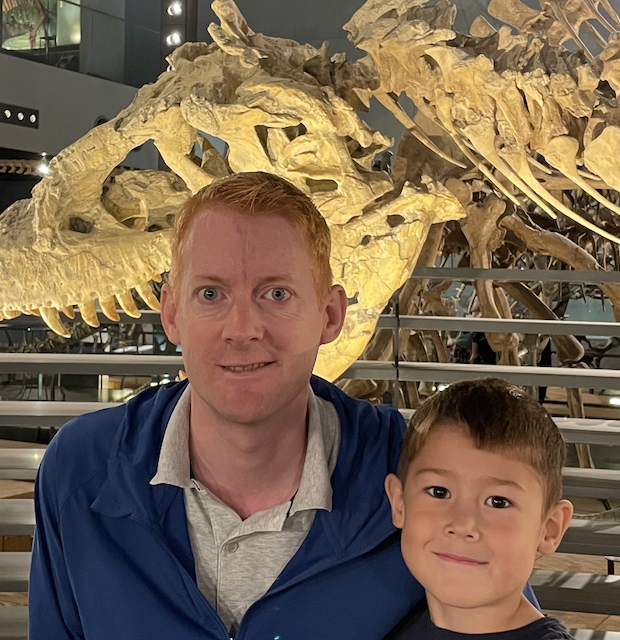Driven by curiosity
We spoke with Jonathan Home, our current Head of the Department, on becoming a Fellow of the American Physical Society (APS) and about his career, motivations and goals.

What does the APS honor mean to you?
It's a recognition of the work that the group and the students have done. What is nice for me is that those who nominated me are people I respect a lot: some of them were my mentors and I've always looked up to them. To see that they value the work that we do is gratifying.
The scientist is not the one who gives the right answers but the one who asks the right questions. What do you think of this statement, and what were the right questions you asked yourself?
The interesting part of science is to ask questions, because this is what scientists can do: you ask questions and usually can't answer them, then you think a bit harder about them, and this leads you to try to new things. For example, back in 2014 we were studying the easiest system you can think of in quantum physics, a harmonic oscillator, and we asked ourselves how to best measure it. We had some ideas and we looked at theoretical papers and we tried things in the lab, always being curious about how the system works, how to get information out of it. Then, at a conference, I heard someone talking about quantum error-correction. This is something you need for a quantum computer to work, and I realised that what this colleague was doing was almost identical to what we were doing in the lab. So, trying to measure a quantum harmonic oscillator led us to implement an error-correction code with trapped ions. From that, a totally new area popped up for our research group. And it was about asking the right questions rather than knowing the answers. To be a physicist you have to enjoy not being able to do things, as you spend most of the time not being able to do things.
Is quantum error correction something for which you're well-known in the scientific community?
I think this is one important aspect of the research in our group, and in fact we were working on more traditional approaches when we fell upon this new method. To me that was a wonderful surprise, that we could still be doing new physics with single quantum harmonic oscillators over the past ten years, one hundred years after the beginning of quantum mechanics, and they're such simple systems. The other focus of research in my group is building large-scale quantum computers. The main goal here is to protect these systems from the errors (that is, noise) that occur when scaling them up. For me, an important aspect of experimental research is that technology advances go hand in hand with physics advances. If you have a new technology, then you can think of how to use it for new research. This sort of innovation is a focus of our group, and I like that we're pushing for new technologies and then see how we can use them for better physics research.
How far are we from getting a functional large-scale quantum computer?
I think it'll be a while. The devices that can be found in today's labs typically have up to a few hundred qubits. By my standards, in terms of working qubits, that is, qubits that do something functional, the biggest system I know of is made of 15 or so qubits – and even there, errors get large and threaten accuracy. To produce an interesting computation, you have to be sure that the result that comes out is correct, which means you have to control the errors by implementing quantum error correction. You might need a thousand 'good' qubits, meaning qubits that are perfectly error-corrected, to achieve something meaningful.
In our lab, each of those perfect qubits would consist of a hundred or five hundred ions. So we'd be looking into five hundred thousand ions for a useful quantum computer: this is a much bigger device than what we deal with at present. Thus the answer to when it will happen is not clear yet. But when we get there, there will be many interesting insights in physics and chemistry. For me, a physical insight that has already occurred is quantum error correction itself: it was completely unthinkable before people started to look into quantum computers. Quantum error correction tells us something very fundamental about physics: you can arbitrarily protect quantum states from noise, which means quantum coherence can live for a very long time in some systems. This isn't something we would expect in quantum systems as they tend to become 'non-quantum' quickly, especially when they're large.

A proverb, likely Japanese, says: The one who lasts 15 minutes longer wins. How did the 'not giving up' aspect play a role in your work?
My wife is Japanese, so that is ironic! She would say it was "the amount of patience in building up these experiments". It takes several years to build up our kind of experiments, and we – my students, especially – all had the patience to keep going. Things usually go wrong at the wrong time, so there really is a lot of patience involved. Whether this is the aspect that allows you to win in the end, well, I don't think in terms of winning. I don't like to be caught up in research races, and this was fairly useful for us at the beginning because we were doing something very different. I think research is more about exploring what's different rather than being in phase with everybody else. Sometimes you need perseverance – but it's not unhealthy, when you get stuck, to put things on a backburner for a while. My brain works like this: I solve problems when I do something totally different. When things get hard, you should probably think about a different approach or even a different problem.
Do you ever feel that you're close to having achieved almost everything in your research? Or do you have many more goals on your wishlist?
I certainly don't feel that I've achieved everything. I went into science because I wanted to find my limits. I made a deal with myself: if I found I got to my limits then I'd do something else. That never really happened – I always realised that I hadn't. I found some limits, but I could still find ways to progress. And I still enjoy doing physics. I also enjoy people, so in my job as the Head of the Department I find it interesting to see how people work. But I don't really set goals for myself; it's more curiosity that motivates me.
As for dreams, for sure, to be in control of quantum error correction would be a dream. I'd like to see large error-corrected systems working and find a way to implement quantum error correction more efficiently. It may be through a new approach that we haven't spotted yet.
And privately, if it's OK to ask?
Of course, I'd like to see my kids doing well, and happy. That's probably less in your control than anything else in your life though, because they are individuals.
Who's Jonathan Home outside of the physics department?
One of my hobbies is playing the violin; recently I started playing tennis. I also read a lot. Most of my life outside of work is focused on my family. I try my best to be with them, even though having to travel for work has certainly put a burden on my wife.
I also enjoy physics enough that to me it isn't really working to be tooling around physics at home over the weekend. I think I'm also a daydreamer, and I feel science is a lot about daydreaming, that is, allowing yourself time to process thoughts and ideas. I find the time for it when I'm traveling and a trip was delayed, for example. Playing the violin also helps me with this: I lose track of what I'm playing and start thinking about something completely different.